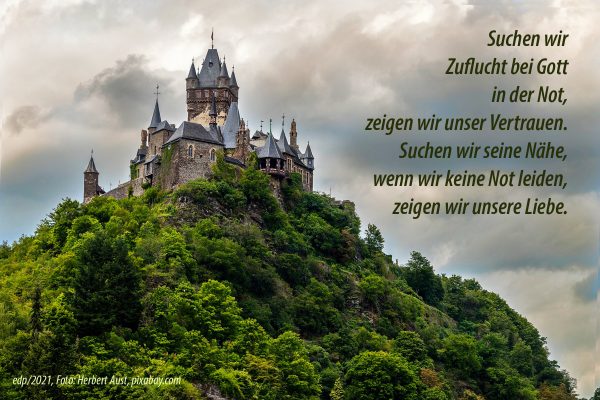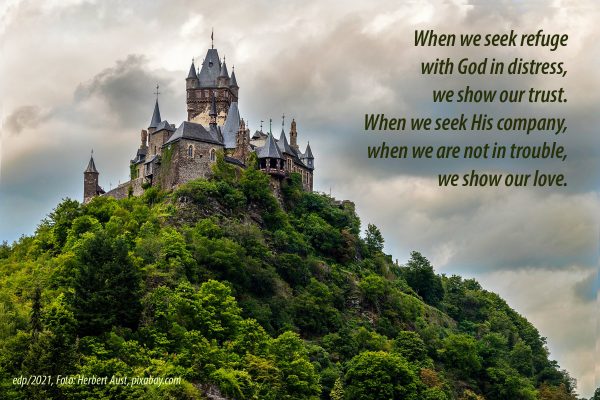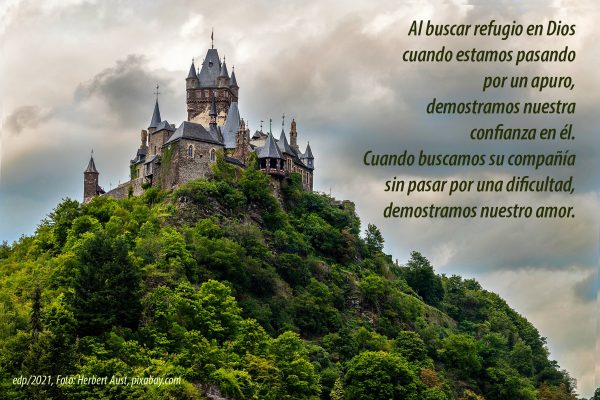In einem Brief an ihren großen Bruder schreibt eine junge Frau im Internet: „Auf dem Spielplatz hast du mich vor den großen Kids beschützt, mit 17 habe ich auf deinem Schoß sitzend meine erste große Liebe beweint.“ Wie schön, wenn Kinder in ihren älteren Geschwistern so etwas wie einen Schutzschirm, einen Zufluchtsort erleben können!
Es war mir nicht bekannt, dass etwas Ähnliches in der Wildnis vorkommt: Afrikanische Zwergantilopen (Dikdiks genannt) leben am liebsten in der Nähe von Löwen. Weil sie so klein wie Hasen sind, werden sie von den Löwen als winzige Happen verschmäht. Dafür genießen sie den Schutz der starken Raubkatzen. In der Nähe von Löwenrudeln können die Dikdiks recht alt werden.

In einem Buch für Manager las ich: „Menschen, die unauffällig im Umfeld Mächtiger leben, nutzen dieses Prinzip ebenso erfolgreich.“
Im Liederbuch der Bibel, den Psalmen, komponierte einer der Sänger:
Wer unter dem Schirm des Höchsten sitzt und unter dem Schatten des Allmächtigen bleibt, der spricht zu dem HERRN: Meine Zuversicht und meine Burg, mein Gott, auf den ich hoffe. Psalm 91,1-2
Der Sänger dieses Liedes hat diesen Mächtigen gefunden, in dessen Nähe er sicher ist. Der HERR ist aber nicht ein Mächtiger, sondern „der Höchste“. Unter seinem Schutzschirm ist Platz genug für jeden, der vor seinen Feinden flieht, wie auch immer diese geartet sein mögen. Wie der größere Bruder nimmt er uns nicht nur in Schutz, sondern er tröstet uns auch, wenn wir niedergeschlagen sind. Gerade wenn wir eine Niederlage erlebt haben, weil wir uns stark genug fühlten, allein zu kämpfen, finden wir bei ihm nicht den erhobenen Zeigefinger, sondern die ausgestreckten Arme.
Sehr schön ist die Antwort, die Gott am Ende des Liedes gibt: „Er hängt an mir mit ganzer Liebe, darum werde ich ihn bewahren. Weil er mich kennt und ehrt, werde ich ihn in Sicherheit bringen.“ (Verse 14, GNB)
Diese Worte zeigen: Gott freut sich besonders, wenn uns nicht in erster Linie die Not zu ihm treibt, sondern die Liebe. Suchen wir Zuflucht bei Gott in der Not, zeigen wir unser Vertrauen. Suchen wir seine Nähe, wenn wir keine Not leiden, zeigen wir unsere Liebe. Das aber ehrt ihn umso mehr.
Herr, ich will so ein Mensch sein, der bei dir mehr sucht als „nur“ Zuflucht in der Not. Stärke meine Sehnsucht nach dir, weil du mich liebst.
![]()
Safety in big brother’s hands
In a letter to her big brother, a young woman writes on the web: “On the playground, you protected me from the big kids; at 17, sitting on your lap, I wept for my first great love.” How wonderful when children can experience something like a protecting umbrella, a place of refuge, in their older siblings!
I was not aware that anything similar occurs in the wilderness: African dwarf antelopes (called dikdiks) prefer to live near lions. Because they are as small as rabbits, they are spurned by lions as tiny snacks. In return, they enjoy the protection of the strong predatory cats. Near prides of lions, dikdiks can grow quite old.
In a book for managers, I read, “People who live inconspicuously around mighty persons use this principle just as successfully.”
In the songbook of the Bible, the Psalms, one of the singers composed: “The person who rests in the shadow of the Most High God will be kept safe by the Mighty One. I will say about the Lord, “He is my place of safety. He is like a fort to me. He is my God. I trust in him.” Psalm 91:1-2
The singer of this song has found this Mighty One in whose presence he is safe. But the LORD is not a mighty one, but “the Most High”. Under his protective umbrella there is room enough for everyone who flees from his enemies, whatever they may be. Like the greater brother, he not only takes us into protection, but also comforts us when we are downcast. Just when we have experienced defeat because we felt strong enough to fight alone, we find with him not the uplifted forefinger, but the outstretched arms.
Very beautiful is the answer that God gives at the end of the song:
“He clings to me with all his love, therefore I will keep him. Because he knows and honors me, I will keep him safe.” (Psalm 91:14)
These words show: God is especially pleased when need does not drive us to Him in the first place, but love does. When we seek refuge with God in distress, we show our trust. When we seek His company, when we are not in trouble, we show our love. But this honors him all the more.
Lord, I want to be such a person who seeks more from you than “just” refuge in need. Strengthen my longing for you, because you love me.
![]()
Protegidos por el hermano mayor
En una carta a su hermano mayor, una joven escribe en Internet: “En el patio de recreo me protegías de los niños grandes, a los 17 años lloré por mi primer gran amor sentada en tu regazo”. ¡Qué maravilla cuando los niños pueden experimentar algo así como un paraguas protector, un lugar de refugio, en sus hermanos mayores!
No sabía que ocurriera algo similar en la naturaleza: los antílopes enanos africanos (llamados dikdiks) prefieren vivir cerca de los leones. Como son tan pequeños como conejos, los leones los desprecian como pequeños bocados. Por otro lado, disfrutan de la protección de los fuertes leones. En las proximidades de las manadas de leones, los dikdiks pueden vivir seguros hasta hacerse viejos.
En un libro para managers leí: “Las personas que viven discretamente en el entorno de gente poderosa practican este principio con el mismo éxito.”
En el cancionero de la Biblia, los Salmos, uno de los cantantes compuso: El que habita al abrigo del Altísimo se acoge a la sombra del Todopoderoso. Le dice al Señor: “Tú eres mi refugio, mi fortaleza, el Dios en quien confío.” (Salmo 91:1-2)
El cantante de este salmo ha encontrado a este Poderoso en cuya presencia está seguro. Pero el Señor no es un poderoso, sino “el Altísimo”. Bajo su paraguas protector hay espacio suficiente para todos los que huyen de sus enemigos, sean quienes sean. Como el hermano mayor, no sólo nos protege, sino que también nos consuela cuando estamos deprimidos. Especialmente cuando hemos experimentado la derrota porque nos sentíamos suficientemente fuertes como para luchar solos, no nos recibe con el dedo índice levantado sino con los brazos abiertos.
Muy hermosa es la respuesta que Dios da al final del salmo:
“Se aferra a mí con todo su amor, por lo tanto lo libraré. Porque me conoce y me honra, lo protegeré”. (Salmo 91:14)
Estas palabras muestran: Dios se complace especialmente cuando no es primordialmente la necesidad lo que nos lleva a él, sino el amor. Al buscar refugio en Dios cuando estamos pasando por un apuro, demostramos nuestra confianza en él. Cuando buscamos su compañía sin pasar por una dificultad, demostramos nuestro amor. Y esto le honra aún más.
Señor, quiero ser una persona que busque de ti algo más que un “simple” refugio en la necesidad. Aumenta mi anhelo por ti porque me amas.




